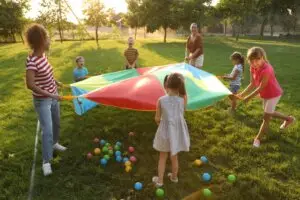Modeling and Discussing Coping Skills with Children at Church
August 26, 2024

This blog is part of a series on Fostering Healthy Minds in Children at Church that provides strategies children’s leaders can use to foster healthy minds in children to whom they minister. And, hey, you may even pick up a tip or two to help those in your personal circles! If you’re new to the series, we encourage you to check out the introduction here.
Modeling and discussing coping skills with children is a vital part of fostering healthy minds in them.
Coping skills are methods a person uses to manage stressful situations or deal with strong emotions. Full transparency: This is my least favorite topic. This is because coping skills are only helpful if they can be accessed.
Have you ever impulsively reacted when you were angry? Maybe you yelled. Maybe you hit. Whatever happened, your brain reacted to a stressor with a fight, flight, or freeze response, which is your body’s way of getting you away from danger and helping you get back to a more relaxed emotional state. When the fight, flight, or freeze response is activated, it blocks our frontal lobe from accessing logic; it blocks our frontal lobe from accessing our coping skills.
So, how do we fix this? We must strengthen the frontal part of our brain so it is strong enough to battle the “feelings” part of the brain.
Coping skills are skills that must be practiced, and their underlying triggers must be addressed. In other words, it’s not a quick process, but similar to building a muscle. Whether we are helping children or ourselves, know that coping skills get easier and better with practice.
And because everyone copes differently, if you want to incorporate this into your missions discipleship group, you need to have multiple options.
I like to start with the three main categories: physical activity, mindfulness activity, and art activity.
Physical Activity
Some kids cope better with physical activity. Some ideas for physical activity or release may be running, biking, hitting a punching bag or pillow, screaming into a pillow, or kicking a ball.
Some adults worry the physical activities can make kids more aggressive, however research does not prove this to be true. Physical activity is a natural release of built-up feelings and tension.
How does this look in your missions discipleship group? Notice if a child is becoming frustrated because they have trouble doing a craft or playing a quiet game. Give them opportunities to do a physical activity, like a high-energy game or choosing an activity to perform after correctly answering a question (jumping jacks, mountain climbers, etc.).
For more ideas, see “Encourage Physical Activity and Movement with Children.”
Mindfulness Activity
Mindfulness activities help a person be present in the current moment.
Do you have a child in your group who is having a meltdown? Ask a helper to take the child to a quiet part of the room, sit with them, and help them focus on their breathing — such as paying attention to their chest as they breathe in and out. Or, they could suggest the child imagine a calm place or something that makes them happy.
The more a person is in touch with the present moment and their bodies, the more time their brain has to reset and access their frontal lobe.
Art Activities
Art is a way to allow children to access the creative parts of their brains. When this happens, it gives the “feelings part” a chance to settle down so that logic and reason can be activated.
Art activities could include coloring, drawing, or using play dough while in an emotional state. Including these during your meeting times may be a way to help reduce the emotional temperature and give children time to be quiet and process.
The more you personally use these skills in front of children (“I am getting a little overwhelmed or upset and I need to take a deep breath”), the better they will understand how these skills are used in real life.
As a leader, there have been times I have led children to do a coping skill with me to help the entire room regulate. Don’t be afraid to show your humanity.
These are merely a few suggestions! But it is helpful to reinforce the healthy coping skills by being consistent with the redirection to the coping skills before the child is completely dysregulated.
Brooklyn Hancock is a Licensed Mental Health Counselor, Registered Play Therapist, mom, and former Certified School Counselor. Her passions are working with children, adolescents, teens, adults, and parents to navigate life’s toughest challenges.
Disclaimer: The information shared on wmu.com is not meant to diagnose or treat a mental health condition. We encourage you to follow up with your health-care provider and seek a mental health professional for individual consultation and care.













